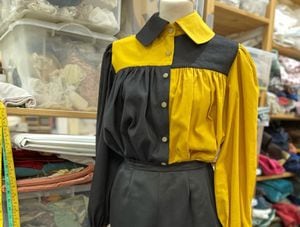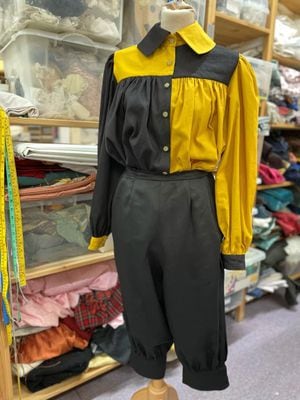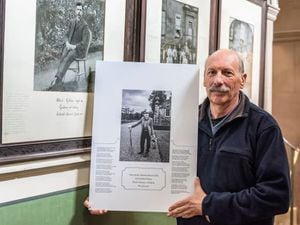Historical Wolves Women football kit created to mark start of 2023 Women's World Cup
Women's football has been put in the spotlight with a very special heritage project to mark the start of the 2023 Women’s World Cup.

Leaders of the Ironbridge Gorge Museum Trust have today announced a collaboration with the Wolverhampton Wanderers Foundation to produce a 19th-century women's football kit.
The striking gold and black kit will go on display at Blists Hill Victorian Town from today and will remain on display until September 13.
Alison Phillips, senior costumer interpreter at the Ironbridge Gorge Museum Trust, took inspiration from a photograph of the Lady Footballers South Team in The Sketch newspaper in 1895.
In the photograph, the women are wearing loose blouses, knickerbockers, shin pads and boots. Alison has handmade a version of the team’s kit in the trust’s on-site costume studio in Coalbrookdale.

She said: “At the Costume Project we’re used to bringing historical garments to life, but producing a women’s football kit has been a first.
"There is limited archive information available about women's football, especially about what the players wore. However, we found photographs and written accounts which gave us enough information to produce this striking kit.”

While evidence suggests women have been playing football for as long as the game existed, women's football was banned by The Football Association in 1921.
The FA said that the game was "quite unsuitable for females and ought not to be encouraged", despite it being more popular than some men's football events and gathering large crowds.
In 1969, the English Women's FA was formed as a result of the increased interest generated by the 1966 World Cup.
Since then, the game has grown in popularity and participation, with more and more professional leagues being launched worldwide.

Anna Price, captain of the Wolves Women team and a Wolves Foundation ambassador, is the club’s record appearance holder, featuring over 300 times.
She said: “The kit looks fantastic and it’s great to see the Wolves colours with a retro twist.
“I made my debut as a 15-year-old in 2001 and, even since then, the women’s game has come on leaps and bounds. It’s great to see the opportunities that are out there for women and girls at the moment.
“To have the Wolves Women playing at Molineux a couple of times last season shows how far we have come. We owe a huge amount to these pioneers who fought for the right to play football.”
The women’s football kit will appear alongside other sports-themed historical clothing, including a 1900s bathing outfit, to tie in with the museum’s Victorian Seaside Experience event from 26 July to 3 September.
The kit will then appear on the catwalk at the Fashion Through The Ages fashion show in Coalbrookdale on 22 and 23 September.
Wolverhampton Wanderers will keep a second version of the kit which will go on display in the Wolves Women exhibit at the Wolves Museum.
Lauren Collier, interpretation curator at the Ironbridge Gorge Museum Trust, said: “Early women’s football teams like the Lady Footballers South were part of the movement that aimed to improve women’s lives and opportunities in the late 19th century and prove that women were just as capable as men.
"They were also very popular, drawing in crowds of up to 10,000 people for their matches.
“Yet despite their apparent popularity and the training the players did with professional male footballers, they were ridiculed by the press, who called their games comical and focussed heavily on the women’s appearance and outfits.
"The Football Association also actively targeted these women's teams by barring ‘lady footballers’ from playing on men's club grounds, which ultimately led to their demise.”





